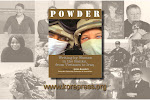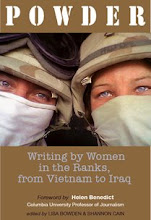 Deborah Fries is the author of the Powder prose poems "Alabama" and "Hartsfield-Atlanta Baggage Claim." She joined the US Air Force in 1968, during the Vietnam War. Fries is the winner of the 2004 Kore Press First Book Award in Poetry and is the former Poet Laureate of Montgomery County, Pennsylvania.
Deborah Fries is the author of the Powder prose poems "Alabama" and "Hartsfield-Atlanta Baggage Claim." She joined the US Air Force in 1968, during the Vietnam War. Fries is the winner of the 2004 Kore Press First Book Award in Poetry and is the former Poet Laureate of Montgomery County, Pennsylvania.He came back to the States in a body cast, encapsulated, bearing a bronze star, a purple heart, and a present for my mother: a 14-lb, signed, bronze nude, cast in Europe – probably Poland – circa 1890. He also brought hip and back pain and night terrors that would be his for life. Medical records from an era that did not recognize PTSD document that he lived with an inordinate fear of death, beginning in his early 30s.
He never talked about what he did in the war, or the day that his driver drove them over a land mine or his feelings about what happened to the driver. In his last decade, he framed the photo of the jeep’s remains and kept it on his desk, as if to remind himself that once it had been possible to cheat death, and that it might be again. He died in 1997 in a V.A. hospital, where he spent the last 18 months of his life unable to remember the war or his post-war occupation or home.
The bronze statue came with a narrative that I had learned by five. I heard how my father pilfered her from a German manor house the winter he was wounded. How, cold and tired and long deprived of all civil comforts, his squad occupied and indulged themselves in that grand house in the Black Forest: how they ate caviar, drank champagne, poached good art. It was the only war story he ever told.
The word PHYRNE is chiseled into her base. A little over 17 inches high from her marble plinth to the top of her classical head, she appears in even the earliest photos of my childhood. On a bookcase, end table, eventually on her own pedestal. In some Christmas photos, she is surrounded by holly or angel hair. I was an adult before I learned that the lovely Phyrne had been a famous 4th century BC Greek courtesan, known for her beauty and willingness to adjust her prices for customers who appealed to her.
For more than 50 years, she remained the tangible and mysterious souvenir of war in our home. The Nazi flag, mortar shell casings, chunks of a demolished German pill box eventually were stowed out of sight, but Phyrne remained gracefully on naked display. Like huge periods of my father’s life that were never discussed, she was the small goddess of a house where no one talked about unpleasant things, where decorated fathers bring presents home from war. She was a siren whose call I could hear. And when I enlisted, I sensed that I would enter my father’s world, bring back something valuable, that I would know things men know.
The military was not the place to work out Oedipal issues. Two decades after my father returned from Europe, I trained for another war, then fled from its possible horrors, impulsively marrying a man who had just returned from Southeast Asia. But with no medals, no cached beauty.
I traded a war-wounded father for a war-wounded husband who – like my father – never reported from the emotional landscape he’d traversed. All his stories from Viet Nam were carved out of a dark humor, in which stoned medics queued up to visit prostitutes or stood along the flight line, taunting the pilots as they took off. I traded being a corpsman pushing bed pans in Alabama for being a wife in Wisconsin, and both tours seemed to be about tending to the unknowable.
So, unlike my Powder sisters who actually went to war and know its reality, I am most familiar with the ghostly artifacts of war – the disassociated wounded who I knew only after they’d returned. Instead of a valuable bronze, I brought back an awareness that even if you spend all of your energy trying to comfort or fix someone, you may never be certain about when he or she was broken, or to what degree. You may never have the psychological hotwash or the spiritual after-action review that can explain who you loved or why your love was not enough.
I honor the women who went to war and came back able and willing to tell their stories; they are braver than I was, braver than men I loved, lovelier in their courage to be real than any idealized version of a woman, having brought back in their voices something living, mortal, transient, present and strong.



3 comments:
What an absolutely beautiful post. Thank you for sharing this writing.
stunning.
This is another shadow of war that tragically haunts families.The strenght of these brave women safeguards my sisters voice to beautifully express her truth.
Post a Comment